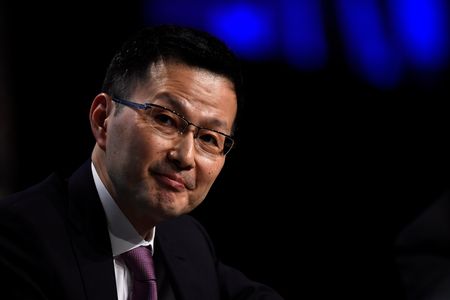By Leika Kihara
SHIZUOKA, Japan (Reuters) -Bank of Japan (BOJ) Deputy Governor Masazumi Wakatabe on Thursday warned against watering down the bank’s 2% inflation target, saying that doing so would undermine the effects of its ultra-loose monetary policy.
He also said the central bank must be cautious about making further tweaks to its policy of yield curve control (YCC), such as widening the band around its 10-year bond yield target.
The remarks came in the wake of a proposal by a panel of academic and business executives to make the inflation target a long-term goal, rather than one that must be met quickly, so that the BOJ can more flexibly raise interest rates.
Wakatabe, a vocal proponent of aggressive monetary easing, said watering down the inflation target risked making the objective of the BOJ’s monetary policy too vague.
“It could undermine the transparency of monetary policy and its effectiveness,” he said in a speech. “This applies to dealing with not only deflation but also inflation.”
Wakatabe also said there was “absolutely no change” in the central bank’s commitment to maintain ultra-loose policy.
With inflation exceeding its 2% target, markets are rife with speculation the BOJ will start raising interest rates when dovish incumbent Governor Haruhiko Kuroda’s term ends in April.
Critics of the BOJ’s ultra-loose policy warn of the rising cost of prolonged easing, such as market distortions caused by the bank’s relentless defence of its yield cap.
COMPANIES RAISING PRICES
Wakatabe, whose term as deputy governor will end in March, said an increasing number of companies were raising prices and becoming more keen to lift wages.
But there was uncertainty on whether such changes in the price outlook would be sustained and help Japan achieve the inflation target in a sustainable manner, he said.
“There’s both upside and downside risks to the price outlook. In fact, downside risks remain fairly strong, so we must not let our guard down,” Wakatabe told a news conference after delivering the speech.
Japan’s core consumer prices in December were 4.0% higher than a year earlier, rising at twice the rate of the BOJ’s inflation target and keeping alive market expectations that the central bank would soon phase out stimulus.
Under attack by investors betting on a near-term rate hike, the BOJ made a surprise tweak to its yield control policy in December by widening the allowance band around its 10-year yield target. As a result, it now allows the 10-year bond yield to rise to 0.5%, up from the previous cap of 0.25%.
While December’s move was necessary to make YCC more sustainable, the BOJ essentially diminished the stimulus effect of its policy by allowing yields to rise more, Wakatabe said.
“We shouldn’t undermine the stimulus impact with policy tweaks,” Wakatabe said, when asked whether the BOJ could raise the cap again, Wakatabe said.
“We must be very, very careful” in deciding whether to make further tweaks to YCC, he added.
(Reporting by Leika Kihara; Editing by Chang-Ran Kim and Bradley Perrett)

